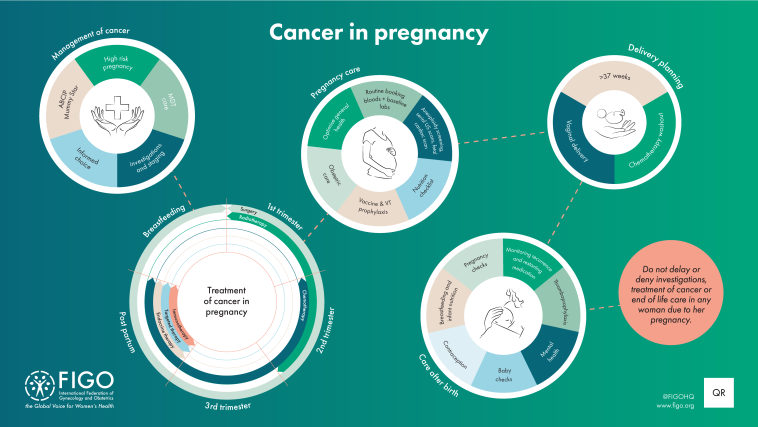FIGO releases best practice advice on cancer during pregnancy

The International journal of gynecology and obstetrics (IJGO) has released a groundbreaking best practice guide by FIGO addressing cancer in pregnancy– an often-underestimated condition due to limited data and complex diagnostic challenges. This new guidance is based on a comprehensive narrative review and offers critical recommendations for managing cancer during pregnancy.
Cancer during pregnancy is relatively rare, but is expected to increase globally as maternal age rises and cell-free DNA testing becomes more widespread. FIGO highlights that physiological changes in pregnancy can delay diagnosis and the lack of experience in managing such cases can lead to suboptimal outcomes for both mother and foetus. This paper emphasises that, in most cases, the principles of cancer management do not significantly differ from those in non-pregnant patients. However, special care must be taken to assess foetal risks from diagnostic imaging, surgery, chemotherapy and radiation.
Treatment approaches
- Surgery can be performed at any gestational age when indicated, though the early second trimester is preferable. Laparoscopic approaches are recommended when suitable.
- Chemotherapy must be avoided in the first trimester but can be administered from the second trimester onwards using standard regimens.
- Radiotherapy is generally avoided, particularly pelvic radiation, though may be considered in the first trimester with careful planning.
Pregnancy-specific considerations
The paper highlights several important pregnancy-related factors:
- Thromboprophylaxis with low molecular weight heparin is recommended for all pregnant women with active cancer.
- Non-invasive prenatal testing (NIPT) should be avoided as maternal cancer can cause false-positive results.
- Foetal surveillance requires regular growth scans and monitoring for complications
- Vaccination should follow standard pregnancy guidelines.
The paper also provides evidence-based guidance on delivery planning, postnatal care, outcomes and prognosis, while addressing the ethical and psychological challenges of cancer during pregnancy. FIGO stresses the importance of multidisciplinary care involving oncologists, surgeons, radiologists, obstetricians, neonatologists and other specialists. This coordinated approach is essential for ensuring both maternal health and foetal well-being.
Designed for use in all healthcare settings– from high-income countries to low- and middle-income regions– this best practice advice aims to provide recommendations on the diagnosis and management of cancer in pregnancy, which can be adopted in all resource settings.